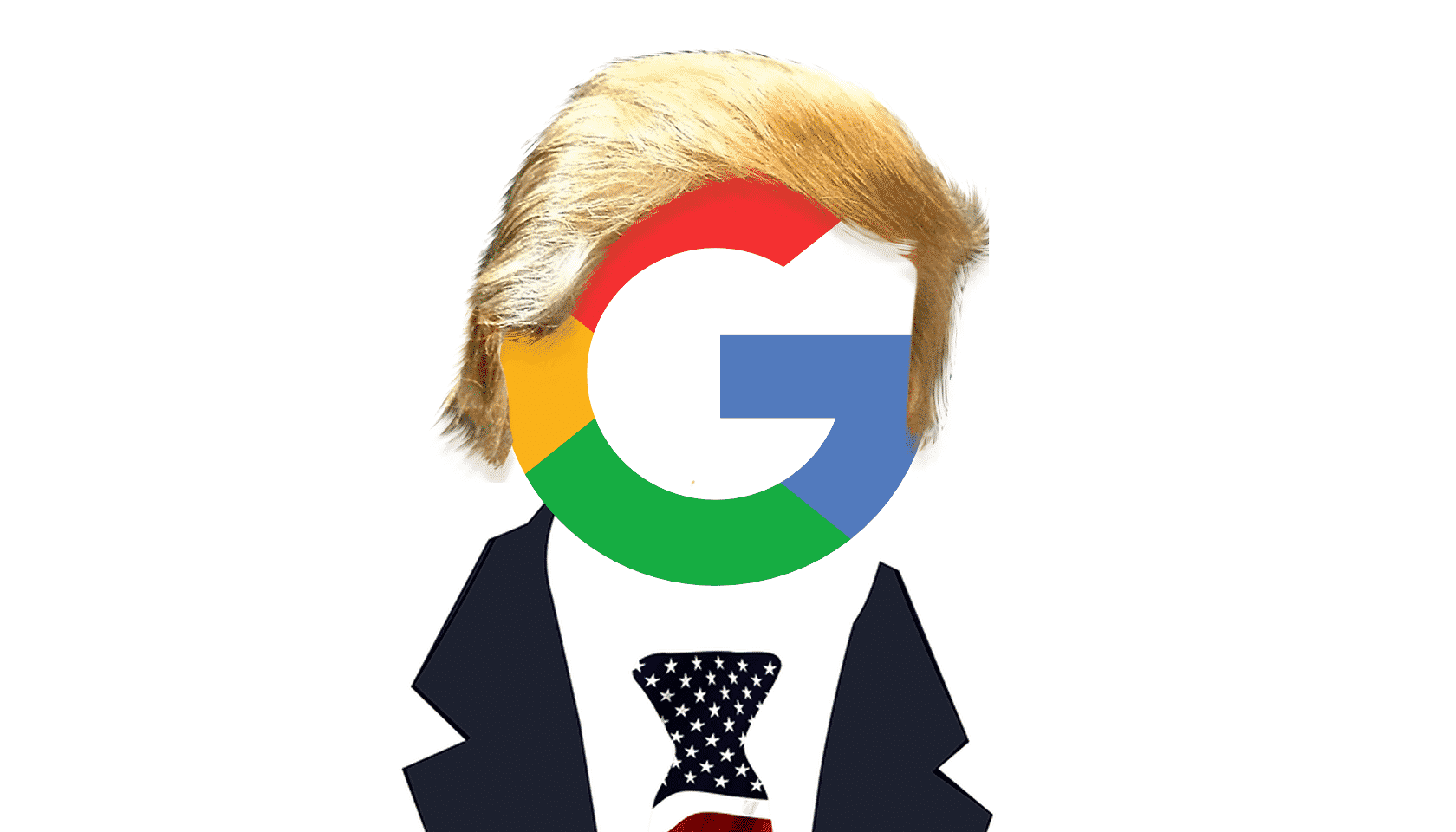Who would’ve thought it? Google, the world’s best-loved and famously forward-thinking search engine, have orchestrated their algorithms to behave just like the controversial and divisive leader of the free world.
Why are Google’s algorithms similar to Donald Trump? Well aside from the lazy comparisons of both possessing huge, unwavering influence and the former’s logo using a touch of the suspiciously familiar orangey-shade-of-yellow we’re accustomed to seeing atop the latter’s head, there are plenty of things. Let’s investigate further.
Unpredictability
We’re in uncharted territory. From the night of the 8th of November 2016 to this very day, experts and leading political thinkers have amassed in every avenue of the media to discuss what having a President that isn’t a politician is going to mean – and nobody has been able to successfully predict Trump’s next moves. Will he really build a wall? Would he really blow up North Korea? Why did he send a tweet saying ‘covfefe’? These are all questions that can’t be anticipated based on the President’s behaviour – and Google’s algorithms act in a similar way.
Just like an irrational late-night tweet from POTUS’s Twitter account, Google’s algorithm changes can come at almost no notice with little information as to what exactly is being changed. This is a bane for SEO dabblers and content writers alike – with the rules on what keywords and metadata can help a quality article appear high on Google’s ever-switching search lists, it’s near impossible to master the search engine’s enigmatic framework.
Don’t get me wrong. Google’s algorithms are much more complex than a couple of brain cells of the “beloved leader”.
Lack of Transparency
Donald may take offence to the accusation of being opaque in his behaviour since starting the campaign to muscle his way into the White House. After all, Trump is an expert in the field. Judging by his Tweet on 6th June 2012 calling Barack Obama “the least transparent President–ever…,” he knows what he’s talking about – and in fairness, the opaque nature of POTUS refusing to reveal his tax returns was turned a little bit translucent when US television network, NBC leaked part of a tax form belonging to Trump from 2005.
Unfortunately, questions over subjects like Russian collusion, removing White House visitor records from public view and the motives of policy all pile evidence on a lack of transparency emanating from Washington, and Mar-a-Lago. Over on the west coast of the United States, it’s a similar story for Google’s algorithms. There are more than 200 factors that make-up the search engine giant’s methods of deciding how to rank content for a given search result – and to date, we only know of a tiny fraction of these.
Perhaps this tiny bit of transparency has led to questions asking whether Google dislikes SEO practitioners. Maybe it does. Maybe they think we’ll start spamming suddenly. Perhaps the website fears that revealing the key to effective search rankings would drown out good, non-SEO content.
Google also shares the President’s fickleness. If all 200 factors of their algorithms were revealed, it’s also worth noting that there are around 500-600 algorithm updates each year. So even if you think you’ve found the recipe for a successfully optimised post one day, the next day your content could be cast aside like Sean Spicer, or Steve Bannon, or CNN, or the thousands of Twitter users blocked by the official POTUS account.
Collusion
There’s a small chance you might’ve heard something about Donald Trump and collusion with Russia. But the president has confirmed this is nonsense and has always denied ever meeting Vladimir Putin before 2016’s Presidential Election – except for the times he’s talked about meeting Putin when they both appeared on ’60 Minutes’, a CBS television show, in 2015. And when he told David Letterman in 2013 that he’d met Putin. And when he told MSNBC reporters that he has a ‘relationship’ with Putin at the 2013 Miss Universe Pageant.
The notion of US and Russian leaders getting along is probably a good thing when considering how volatile and begrudging the two figureheads are, but it’s problematic when democracy and fairness are alleged to have been compromised in the process.
Similar allegations could be made of the Google algorithms’ prioritising of big name search results at the cost of relevance and quality (I’d love to be proved wrong).
The key factor Google uses in upholding the hegemony of keeping big brands exposed are the algorithms surrounding the strength of a particular domain. If Google sees a powerful domain, it’s likely to rank it higher regardless of the quality of its posts. For example, Forbes generally ranks highly in search results despite being guilty of publishing sloppy content at times, let alone the terrible user-experience for mobile users.
Through seeking to keep the status quo of big name blogs and websites ranking high on their results pages, Google’s algorithms risk alienating newer, high-quality blogs, while encouraging complacent content from guest bloggers seeking more hits and traffic. Like with Donald, Google has decided to use powerful domains to establish and consolidate their position as a global leader in their field.
Of course, all analogies are destined to break down at some stage, and it’s worth bearing in mind that Google’s know-how is the sole reason why they’ve continually beaten countless competitors to remain top of their industry. Their algorithms, though hard to digest at times, are ever changing in a way that has brought so much success in consolidating the search engine’s position at the pinnacle of their industry.
Another contrasting factor between Google’s algorithms and Donald Trump is that, as yet, Google’s algorithms haven’t threatened to “totally destroy” North Korea, aren’t accused of being racist, are trying to battle real “Fake News”, and are generally more rational. Which, I think most of us can agree, can be considered a positive thing.
And, as a final remark, Google, SEOs are fine people, so please be more transparent.

